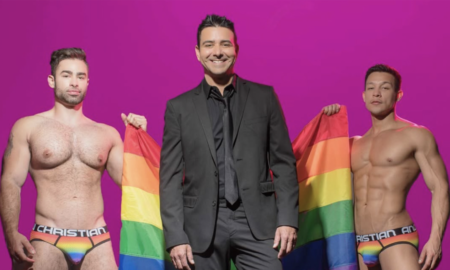You can’t blame anti-gay marriage campaigner Kim Davis’s three husbands for wanting out. Just look at the woman! But you’d think having been divorced no fewer than three times, you might have a little humility when it came to the subject of the sanctity of marriage. Not Kim.
Imani Gandy’s blunt warning — that same‑sex marriage is ‘absolutely on the chopping block’ — should be read as more than rhetorical flourish. In an op‑ed for Rewire News Group, she argues that the legal groundwork that enshrined marriage equality in Obergefell v. Hodges is suddenly vulnerable, and she points to a concrete vehicle for that challenge: a petition filed by the lovely Kim, the Kentucky county clerk who once refused to issue marriage licences to same‑sex couples and who later faced jail for her refusal and became a Christian martyr in the process (yes, despite the multi-divorces!) The petition asks the Supreme Court to revisit and overturn Obergefell, a move that, if accepted, could erase a decade of settled rights overnight.
Kim’s previous case reached the Sixth Circuit before being presented to the Supreme Court, and the legal arguments she presses now are familiar to conservative challengers who seek to reframe equal‑protection and liberty doctrines to exclude same‑sex couples. That personal history — of deliberate refusal, civil contempt and national attention — means the petition serves both as a legal instrument and a political signal.
The Court has already begun the procedural dance that precedes any substantive decision: it has invited responses from parties and solicited briefing, a step commentators read as an indication that at least one justice wants more material before deciding whether to grant review. SCOTUSblog’s analysis explains that for the petition to be heard the justices must vote to grant certiorari — a threshold that requires at least four votes — and that Dobbs‑era opinions from the current Court have opened the door to re‑examination of precedents once thought secure. Whether the Davis petition will clear that barrier this term remains an open and urgent question.
If the Supreme Court does take up the Davis petition and moves to dismantle Obergefell, the practical consequences for married same‑sex couples would be immediate and varied: state laws might suddenly diverge, federal benefits and recognition could depend on litigation or legislation, and couples who married under Obergefell could find long‑standing legal protections in flux. Restoring or protecting marriage equality in such a scenario would require sustained legal defence, congressional action to enshrine protections in statute, or electoral shifts that change the composition of the Court. Those remedies are political as much as legal — and they are not guaranteed.
Source: Noah Wire Services


















